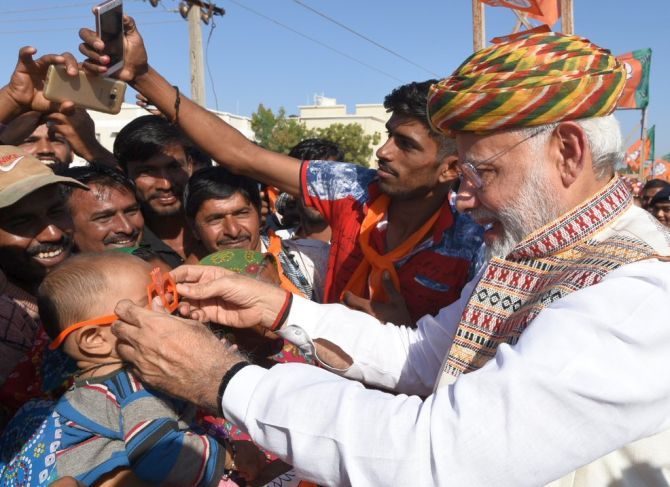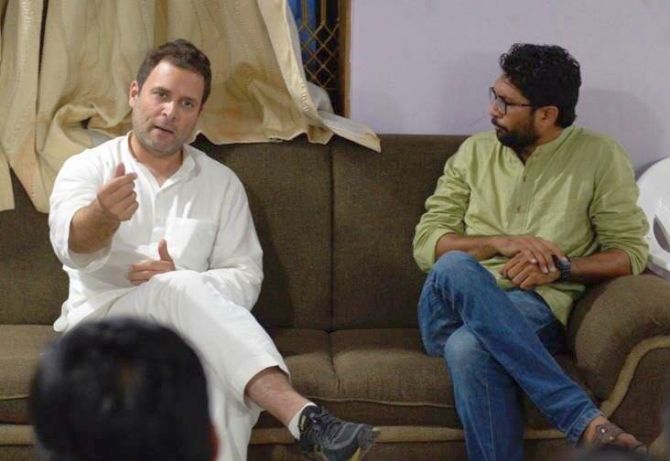'The BJP will be wiped out in rural Gujarat.'
'In urban areas, its tally may come down from 55 of the 60 urban seats it won in 2012 to 35 to 40 seats this time.'

In what could perhaps be the first open admission of how untenable the coming together of the Dalits, OBCs and Patidars against the Bharatiya Janata Party will be if the BJP is trounced at the hustings, Dalit leader Jignesh Mewani says that despite these contradictions, Patidar leader Hardik Patel and he will together visit scheduled caste, scheduled tribe constituencies to campaign against the BJP.
Mevani, 34, a lawyer and social activist -- who will contest the Gujarat assembly election from the Vadagam (SC) seat in Banaskantha district as an Independent candidate -- tells Archis Mohan that Hardik Patel, Alpesh Thakor and he have challenged Prime Minister Narendra D Modi, BJP President Amit A Shah and Gujarat Chief Minister Vijay Rupani for a debate on the 'Gujarat model' of development.
Dalits, Patidars and Thakore communities have contradictions on the ground. Given that these communities have conflicting interests, how probable is it for these to united?
Six years back, a non-governmental organisation had surveyed 1,589 villages of Gujarat. It found 98 types of untouchabilities within the Dalit community itself.
For example, the Chamar community does not inter-dine with the Valmikis. But the Una incident unified all the Dalit sub-castes.
That incident drove over three dozen Dalits to commit suicide by consuming poison, so deep was the feeling in the community (In July 2016, Dalit men were stripped and beaten by a group of self-appointed 'gau rakshaks', that fueled a Dalit agitation across the state).
Our movement overcame internal contradictions and issues of identity.
Similarly, Dalits, Patidars and OBCs have come together as all consider themselves victims of the so-called Gujarat model of development.
I agree there are social, cultural and economic contradictions between the Dalits, Patidars and OBCs. But now the principal contradiction is with the BJP.
The BJP is our common enemy and that has united us.
I also agree that our contradictions would sooner or later surface.
It does look improbable that Surat's safai karmacharis and the city's traders would have similar demands.
In rural areas, there are contradictions between farmers and landless labourers. But at the current juncture, the discontent on the streets and markets of Gujarat is unprecedented.
Patidar and Dalit youth have disrupted nearly a dozen public meetings of Amit A Shah and Narendra D Modi.
An anganwadi worker stopped the PM's convoy and threw bangles at his vehicle. A BJP corporator in Vadodara was beaten up by local women.
This Gujarat government has not lived up to Modi's claim of 'Sabka saath, sabka vikas'. It is wedded to the interests of big money.

What is your assessment of the assembly election?
While it is always difficult to forecast an election result, there has been substantial consolidation of anti-BJP votes.
I believe the BJP would be wiped out in rural Gujarat.
It has tried to reach out to traders in urban areas by recent GST-related announcements. But in the urban areas as well, its seat tally might come down from 55 of the 60 urban seats it had won in 2012 to 35 to 40 seats this time.
I believe the BJP is unlikely to cross 80 seats (Gujarat has a 182 seat assembly).
However, I also believe a free and fair election is difficult. It has become a question of the BJP's prestige to win Gujarat. They would go to any extent.
If they lose Gujarat, they know they will lose India.
Their corporate backers, who have invested in the current BJP leadership, will also support them to the hilt.
So, are you campaigning for the Congress?
We are not campaigning for any party. We are appealing to the people to vote against the BJP, not vote for the Congress.
The BJP is different from most other political parties. I believe it is a fascist regime.
Unlike the others, the BJP wishes to amend the Constitution and thrust a 'Hindu Rashtra' on us.
Our movement has not shared the platform with any other political party, not even the Congress. We have our independent identity.
If any other party comes to power or contests 182 seats, we will question them where they stand on Dalit issues.
We have also asked Rahul Gandhi where he stands on Dalit issues.
We are not going to contest elections (this interview was conducted before Jignesh decided to contest). I have not demanded tickets for myself or my associates.
The next stage of our campaign is from November 26, Constitution Day, to December 6, Babasaheb's death anniversary.
We will visit assembly constituencies reserved for scheduled castes, and also some of those reserved for scheduled tribes. Hardik Patel will also join me.
The campaign will culminate with a public rally in Ahmedabad on December 6 where we expect in excess of 50,000 people to gather.
These will be landless labourers, farmers, Dalits, Patidars, all communities which feel they have been victims of the 'Gujarat model'.
Modi is expected to address several rallies across Gujarat. Wouldn't that change the narrative?
Modi has already addressed three rallies and visited Gujarat at least 10 times in the past few months. But his public rallies have not clicked.
The BJP's other planks, including 'vikas' have not clicked. Hardik Patel's purported sex CD has not clicked.
Now they are relying on the communal card.
We are telling people that they should ask BJP leaders about the price of diesel and petrol, not the Ram temple.
We have exposed the hoax that this 'Gujarat model' is.
I challenge Modi, Shah and Rupani to have a debate with Hardik, Alpesh and myself on the issue of development.
Where do you stand on the Patidar community's demand for reservations?
I do not have clarity on the issue. You would need to ask Constitutional experts on whether and how it can be done.
But there is a larger question to this issue.
Whether it's the Gujjars in Rajasthan, the Marathas in Maharashtra and the Patels in Gujarat, all of whom want reservation; and the Dalits and OBCs -- who already have reservation -- all of us need to ask the PM about the promise he made in 2014 of creating 20 million jobs a year.
We need to question the government on basic issues of roti, kapda aur makan, price rise and corruption, and not allow them to divert attention by some purported CD of Hardik.
What is your future political strategy?
Post Una, our movement has given a sense of empowerment to the Dalit community.
There is generally a feeling among Dalits that the 'manuwadi' (loosely the upper caste dominated) media doesn't give Dalit causes any space.
But ever since Una, our cause has found a resonance in the media and across the country.
The Dalit movement in Gujarat and our issues have been covered widely by the media. It has also been possible because we have an independent identity.
As for a future political strategy, I can only say that I would not be rigid.
I won't be politically stuck if only to remain ideologically pure.
I hope my politics remains dynamic, but not for any personal interest and always for the larger good.
Photographs: TOP: Prime Minister Narendra D Modi on the campaign trail in his home state Gujarat, November 27, 2017. Photograph: @narendramodi/Twitter
BOTTOM: Jignesh Mevani, right, with Congress leader Rahul Gandhi, November 3, 2017










